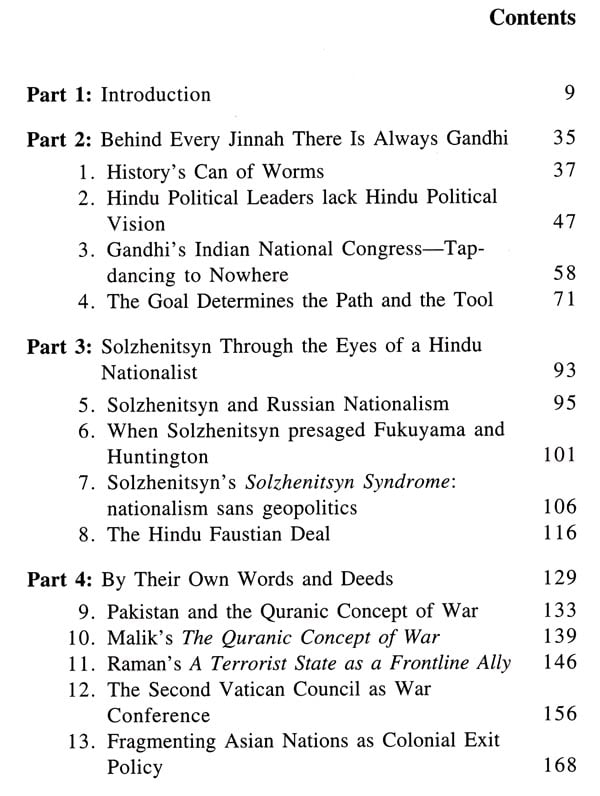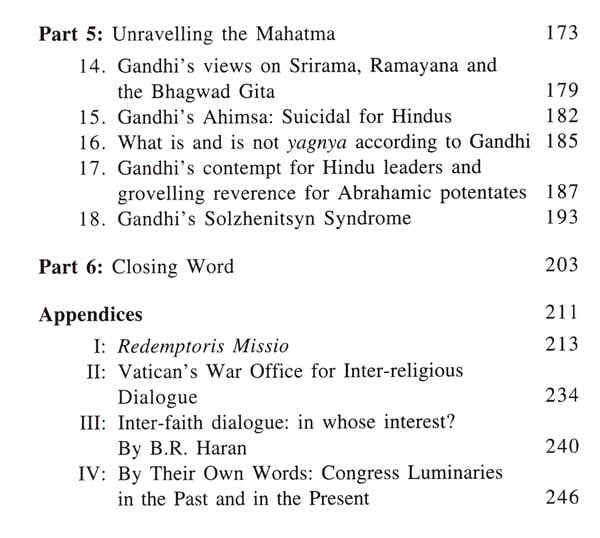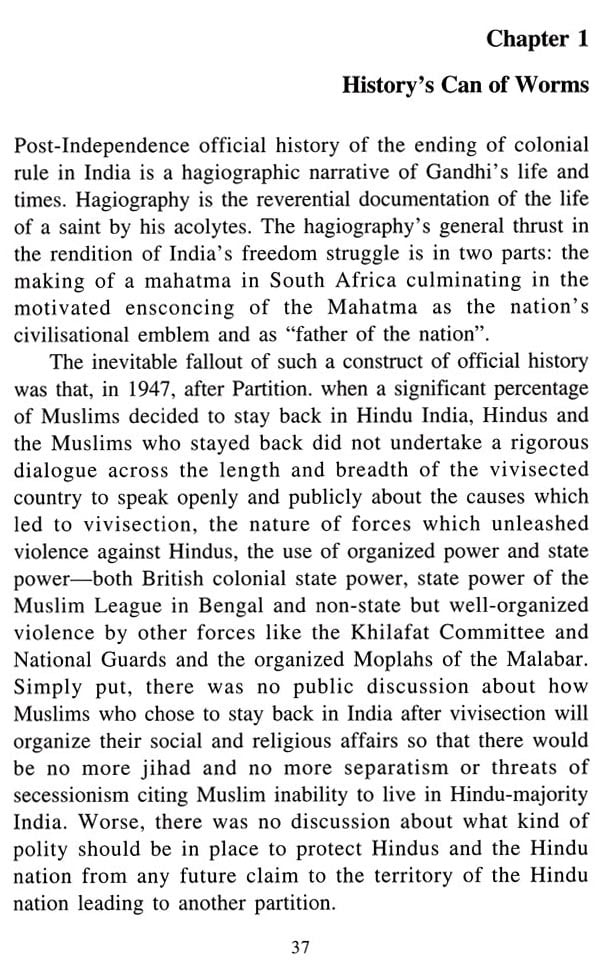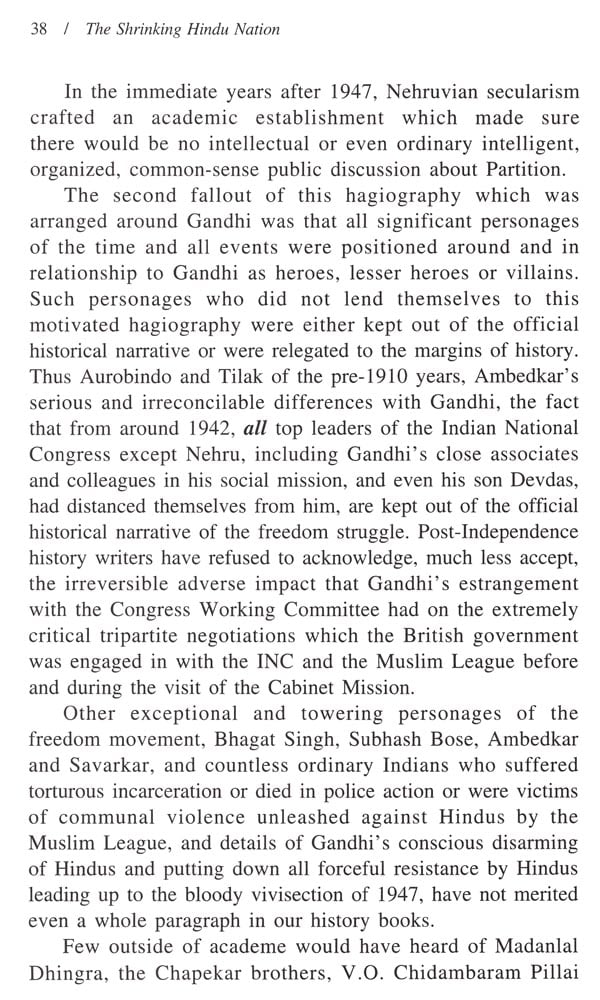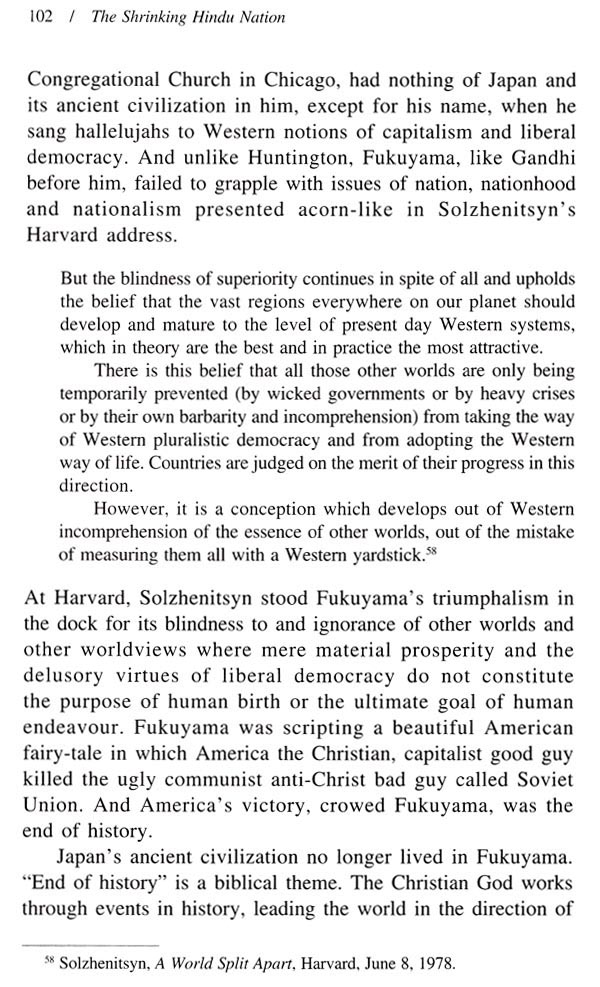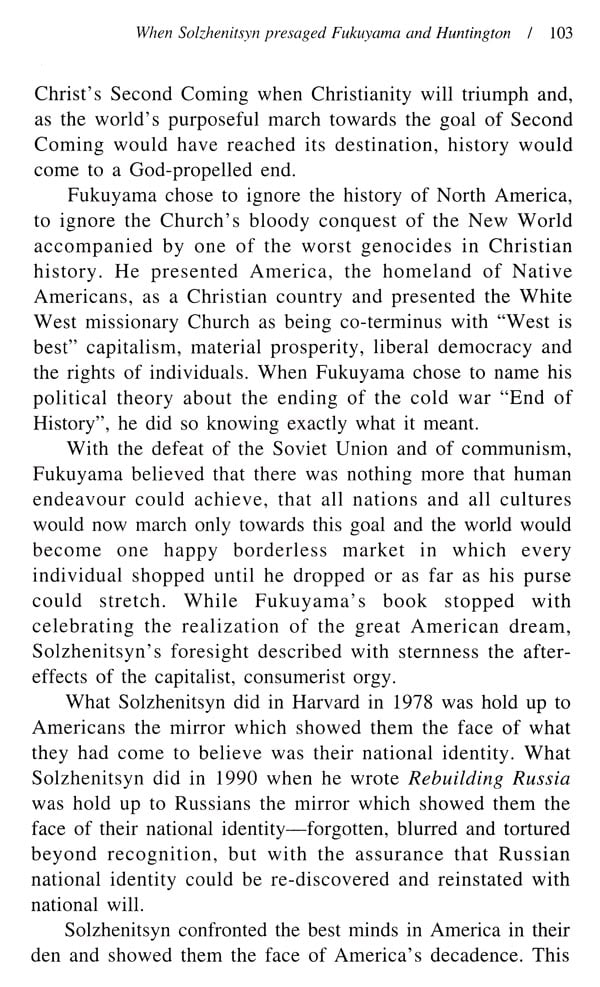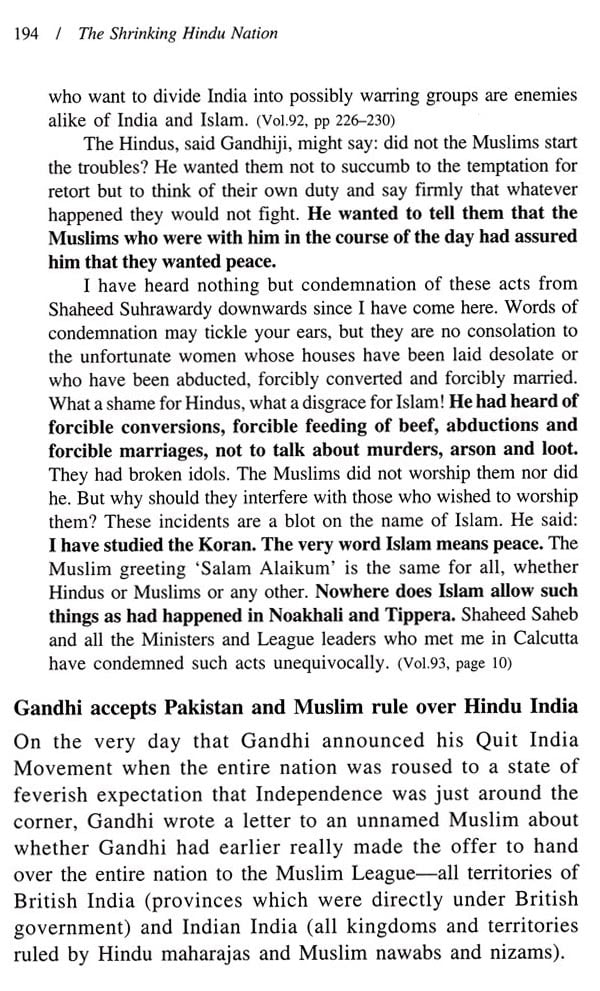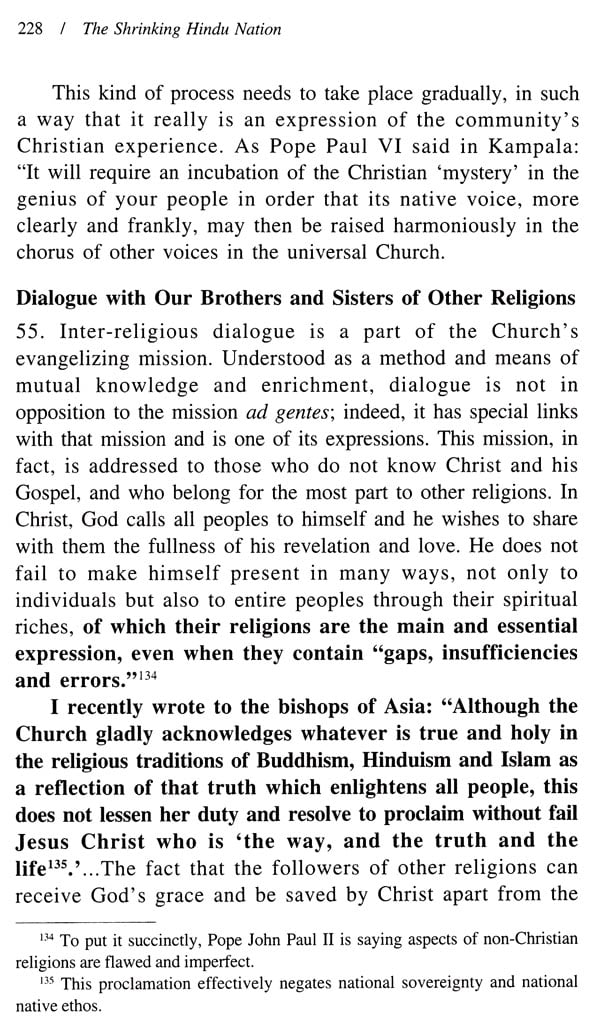
The Shrinking Hindu Nation
Book Specification
| Item Code: | NAR634 |
| Author: | Radha Rajan |
| Publisher: | Voice of India New Delhi |
| Language: | English |
| Edition: | 2019 |
| ISBN: | 9789385485183 |
| Pages: | 247 |
| Cover: | HARDCOVER |
| Other Details | 9.00 X 6.00 inch |
| Weight | 430 gm |
Book Description
This book is an extremely topical and hard-hitting account of the dangerous realities that threaten the very survival of the Hindu nation. Radha Raj an draws on the historical lessons of the dismemberment of the Soviet Union to interpret - citing documents in the public domain - the steady dismemberment of our own nation during the freedom struggle and right down to today, all with the active collaboration of the Indian political and intellectual elite of the time. The avowed objective remains the erasure of the Hindu nation and, quoting chapter and verse, she establishes Gandhi as directly responsible for the Partition of 1947. She shows how his corrosive legacy, suicidal for Hindus, still perverts our polity, and she concludes her analysis with a warning and a hope.
RADHA RAJAN is a political thinker and author who writes extensively on the Indian polity from the perspective of a Hindu nationalist. In the present book, she takes forward the theme she developed in her two earlier books - Eclipse of The Hindu Nation and Jammu & Kashmir Dilemma of Accession.
The state of the Hindu nation and the productivity quotient of its thinkers and intellectuals, 71 years after colonial rule ended in 1947, is not dissimilar to the Russian nation described by Aleksandra Solzhenitsyn in 1973 when he wrote As Breathing and Consciousness Return. This was a polite but scathing critique of Andrei Sakharov's 1968 treatise Reflections on Progress, Peaceful Coexistence and Intellectual Freedom. If Sakharov's treatise was a path breaker in the post-Stalin Soviet Union still in the throes of Stalinism, Solzhenitsyn's critique was just as earthshaking and signaled the beginnings of intellectual resistance and cerebral counter-revolution.
As for the rest of us, we have so shriveled in the decades of falsehood, thirsted so long in vain for the refreshing drops of truth, that as soon as they fall upon our faces we tremble with joy. We so rejoice in every little word of truth, so utterly suppressed until recent years that we forgive those who first voice it for us, all their near misses, all their inexactitudes, even a portion of error greater than the portion of truth, simply because "something at least, something at last has been said!"
Solzhenitsyn wrote the critique but did not publish it as samizdat or self-publication. Instead, he showed it first to Sakharov; a courtesy which Solzhenitsyn respectfully extended to the legendary nuclear physicist turned political activist. Solzhenitsyn was respectful of Sakharov even in his critique because Sakharov had dared to end the Stalinist-era enforced silence and censorship of Soviet thinkers and intellectuals-artists, writers, teachers, journalists, mathematicians and scientists. While Solzhenitsyn extolled Sakharov's courage which exposed the intellectual void in the country lasting 50 years since the Bolshevik Revolution, he also faulted Sakharov for not speaking the whole truth and for sidestepping the thorns on the path of truth.
This is a canker which has eaten into all of us. From the very beginning, however resoundingly the word "self criticism" was pronounced, however boldly printed, it has always been criticism of the next man. So when we take into our heads to talk about ourselves today, an unconscious longing to extenuate our faults deflects our pen from the straight hard line of truth.
We timidly feel that to mention aloud the defects of our social order and our country is a sin against patriotism. The discriminatory tolerance of one's own and simultaneous severity towards others shows through more than once in Sakharov's work and to begin with on the very first page: in the crucial stipulation that although the object of his work is to facilitate the rational coexistence of world ideologies, he does not mean by this "ideological peace with those fanatical, sectarian and extremist ideologies which admit to no possibility of rapprochement, no discussion or compromise, as for instance the fascist, racist, militarist or Maoist ideologies;
But what strange modesty explains the omission of precisely that ideology which at the very dawn of the twentieth century declared all compromises to be rotten and treacherous, all discussions with the heterodox to be idle and dangerous twaddle, and proclaimed that in armed struggle and in the division of the world into red and white, into those for us and those against us, lay the only solution for social problems.
Solzhenitsyn expressed pungent disapproval of Sakharov's refusal to list communism by name among those ideologies with which no rapprochement was possible when communism itself believed that violent confrontation alone and not rapprochement against opposing forces was the only solution.
Why then does Sakharov not mention it? Does he suppose that it can be talked round by gentle persuasion?
A paragraph later Sakharov mentions among the "extreme expressions of dogmatism and demagogy", side by side with the same old racism and fascism
Stalinism. But this is a poor substitute. Stalinism is a very convenient concept for those purified Marxist circles of ours, who strive to differentiate themselves from the official line, though in reality the difference is negligible. For the same purpose the concept of Stalinism is still more important and necessary to Western Communist parties-they shift onto it the whole bloody burden of the past to make their present position easier.
But close study of our modern history shows that there never was any such thing as Stalinism (either as a doctrine, or as a path of national life, or as state system), and official circles in our country, as well as the Chinese leaders, have every right to insist on this. Stalin was a very consistent and faithful-if also very untalented-heir to the spirit of Lenin's teaching.
The purpose of The Shrinking Hindu Nation is to hold up the very same mirror to all Indians, Hindus and Hindu nationalists in particular, that which Solzhenitsyn held up to the timid, cowardly and self-serving intellectuals of his times. This book looks inward at Hindus and takes the first step in the long process of "self criticism". It holds up the mirror which reflects Hindu failure to articulate sharply and factually how, just as there was no Stalinism but only Lenin and Leninism, the peculiar creature called Nehruvian secularism was conceived in the womb of Gandhian notions of Hindus, Hinduism and India, with genes from Nehru's own Left-leaning ideas of economy, society and polity. If Soviet intellectuals painted the face of communism with the mask of Stalinism, Hindus, with no political self-consciousness and far away from self-criticism, pass off even now as Nehruvian secularism, the destructive and disintegrating power of Gandhi's Idea of India.
This book will establish that Jinnah and the Muslim League succeeded in their objective to tear apart the Hindu nation to carve out Pakistan only because Gandhi disempowered and disarmed the Hindus so thoroughly that we were unprepared both in body and mind to avert Partition. This book is the sequel to my Eclipse of the Hindu Nation: Gandhi and his freedom struggle. Hindu nationalists, for whom Eclipse was written, insulated their minds and intellect from the searing contents of Eclipse and, with ostrich-like timidity, buried their heads in the sand; they could not lie or pretend that the book did not speak the unvarnished truth, but lacked the courage to call the thing by its right name.
The Shrinking Hindu Nation has had to be written because, after the crushing defeat of the Bharatiya Janata Party in the five State Assembly elections in 2018, elections in which the "Hindu Nationalist Party"3 lost its bastions in Madhya Pradesh, Rajasthan and Chhattisgarh, and failed to conquer new territory, the prospect of the Congress returning to power at the Centre in 2019, in alliance with a motley group of other anti-Hindu nation Nehruvian secularists, is a possible nightmarish reality. Hindus, nowhere near to self-criticism even in 2019, much less to call things by their right name and weighed down by intellectual sloth, continue to extenuate with "an unconscious longing" our collective faults, abject failures and near-misses in politics "which deflects our pen from the straight hard line of truth". "The straight hard line of truth" is that what the Congress wanted for India since its own inception in 1885, and wants even now in 2019, is diametrically opposite to what Hindu nationalists wanted then and want now. Hindus within the Congress party have failed to re-define the Congress and Hindus outside the Congress have failed to state publicly that the Congress party's ideology has always been covertly anti-Hindu in orientation.
Just as Sardar Patel, K.M. Munshi and C. Rajagopalachari, despite knowing well where Gandhi's political notions were leading the Indian National Congress and the Hindu nation, did not stop him or distance Gandhi from the INC (a very achievable measure), Hindu nationalists and the Bharatiya Janata Party have failed to stop the Congress from carrying forward Gandhi's determined objective to de Hinduise the Hindu nation.
Gandhiji gave to his ideal society the name Ramrajya. "Let no one commit the mistake of thinking that Ramrajya means a rule of the Hindus. My Rama is another name for Khuda or God. I want Khudai raj, which is the same thing as the Kingdom of God on earth. The rule of the first four caliphs was somewhat comparable to it. The establishment of such a rajya would not only mean welfare of the whole of the Indian people but of the whole world.'
Not calling a thing by its right name began with Gandhi.
The truth is also that Hindu nationalists have not mustered the courage yet to dislodge Gandhi from the Mahatma pedestal upon which Hindus placed him in 1915 when he returned to India from South Africa. Hindus fail to see that, while we placed Gandhi on the Mahatma pedestal with reverence, Hindu, non-Hindu and anti-Hindu Nehruvian secularists want him on that pedestal even if they do not worship him with Hindu fervour, because Gandhi and Gandhigiri serve their purpose well.
